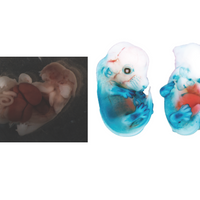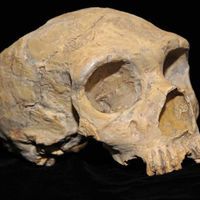Login
Subscribegenetics & genomics

Image of the Day: Gnashers
Carolyn Wilke | Feb 18, 2019 | 1 min read
A mollusk grows magnetic teeth so tough they can grind down rocks.

Preliminary Results Point to Success of In Vivo Gene Editing
Carolyn Wilke | Feb 12, 2019 | 2 min read
Two studies show signs that the introduced DNA is functioning, but it’s too early to know if patients actually benefit.

UC Berkeley Team to Be Awarded CRISPR Patent
Kerry Grens | Feb 11, 2019 | 2 min read
The group had argued that a patent given to the Broad Institute overlapped with this one.

Specific Gut Microbes Linked with Depression: Study
Ashley Yeager | Feb 4, 2019 | 2 min read
The research is among the first to find the connection in humans.

Mutations in One Gene Linked to Two Separate Birth Defects
Emma Yasinski | Feb 1, 2019 | 4 min read
The same network of transcription factors may be responsible for both cleft palate and neural tube defects, according to a new study connecting mouse and human data.

Immune Response to Gut Microbes Linked to Diabetes Risk
Abby Olena, PhD | Feb 1, 2019 | 3 min read
Researchers find that it’s not just high-risk genes, but how children’s bodies respond to their own intestinal microbiota that relates to future diagnoses of type 1 diabetes.

Perennial Explorer: A Profile of Neelima Sinha
Anna Azvolinsky | Feb 1, 2019 | 8 min read
This University of California, Davis, botanist studies the genes that regulate plant anatomy.

Companies Use CRISPR to Improve Crops
Ashley P. Taylor | Feb 1, 2019 | 9 min read
The agritech industry is editing plant genomes to feed a growing population, expand the produce aisle, and make tastier, more convenient food products.

Caught on Camera
The Scientist | Feb 1, 2019 | 1 min read
Selected Images of the Day from the-scientist.com

Opinion: GE Crops Are Seen Through a Warped Lens
Rod A. Herman, Nicholas P. Storer, and Bryan Delaney | Feb 1, 2019 | 3 min read
Risks that pertain to all manner of new crops are often misattributed to genetic engineering. This distorts the public’s view of the technology.

Zach Lippman Susses Out How Gene Regulation Affects Plant Phenotypes
Shawna Williams | Feb 1, 2019 | 3 min read
The Cold Spring Harbor Laboratory researcher is fueled by curiosity about how one species’ genome can produce a wide variety of traits.

The Human Genetics of Night Owls and Early Birds
Jef Akst | Jan 31, 2019 | 2 min read
When people prefer to go to bed is linked to hundreds of variations in their genes.

Clones Made of CRISPRed Monkeys
Carolyn Wilke | Jan 25, 2019 | 2 min read
Researchers edited macaque embryos to induce symptoms of sleep disorders and chose one animal to clone. A bioethicist questions the study’s appropriateness.

First Successful Gene Drive in Mammals
Abby Olena, PhD | Jan 23, 2019 | 4 min read
Researchers use a CRISPR-Cas9 strategy to expand a desired trait from 50 percent of mouse pups to about 72 percent.

Neanderthal Ancestry in Europeans Unchanged for Last 45,000 Years
Diana Kwon | Jan 23, 2019 | 4 min read
The findings of a new study contradict previous results from some of the same scientists that suggested Neanderthal DNA was gradually removed from modern human genomes.

Scientist Forged Ethical Reviews for CRISPRed Babies
Kerry Grens | Jan 21, 2019 | 1 min read
He Jiankui could face charges after an investigation finds he used techniques prohibited in China to edit the genes of twin girls.

A New Role for Yeast Introns: Helping Cells Cope Under Stress
Katarina Zimmer | Jan 16, 2019 | 4 min read
Two studies contest the idea that the noncoding sequences are just “junk DNA,” demonstrating that they play important roles in the regulation of cell growth.

More Cancer Mutations, Better Immunotherapy Outcomes
Catherine Offord | Jan 15, 2019 | 2 min read
Immune checkpoint inhibitors are generally most effective against tumors with more genetic mutations, according to a new study, although the relationship isn’t true for all cancers.

Stem Cell–Derived Neurons from People with Autism Grow Differently
Jef Akst | Jan 11, 2019 | 2 min read
Changes in gene expression also hint at how the brains of people with ASD develop differently from those of other people.
